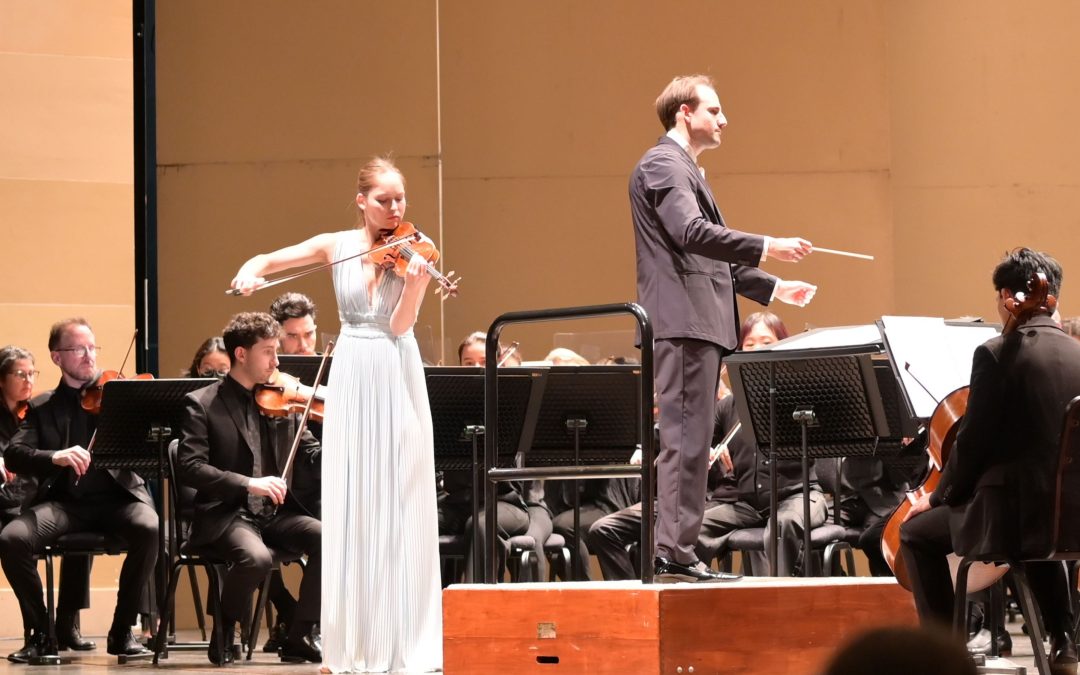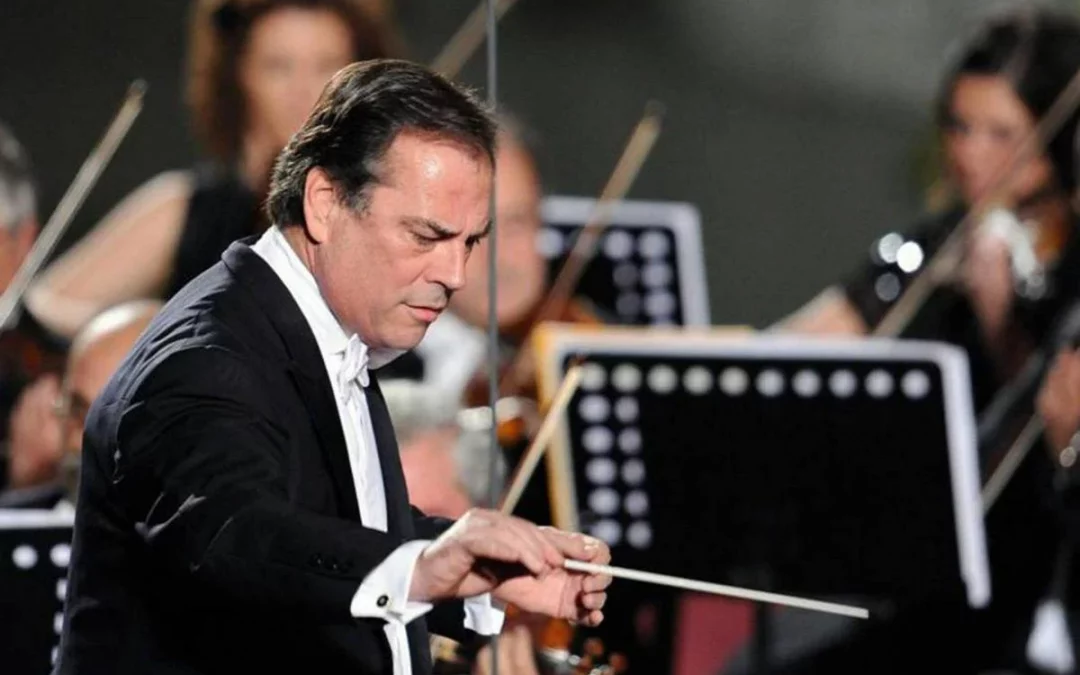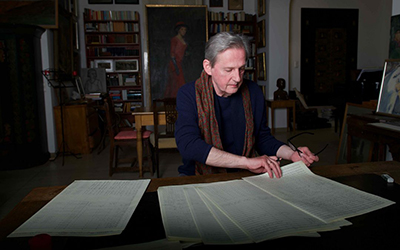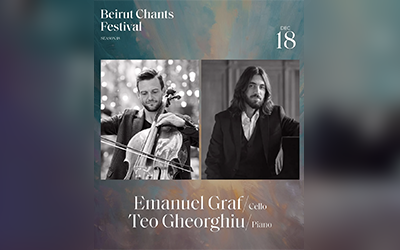
by AdminTyBarts | Feb 5, 2026 | News
Conductor François López-Ferrer has received glowing critical acclaim following his recent appearance with Symphony San Jose at the California Theatre, in a program featuring works by Schubert, Sibelius, and Schumann alongside violinist Geneva Lewis.
Writing for San Francisco Classical Voice, Joseph Sarmenta described an evening “defined by an impressive clarity — of sound, intention, and interpretive vision,” highlighting López-Ferrer’s leadership throughout the program.
Sarmenta especially praised López-Ferrer’s partnership with the soloist, noting that the conductor “exercised tight and impressive control of dynamics and pacing to let the soloist’s brilliance shine without disrupting the orchestral strings.” The review also singled out Schumann’s Symphony No. 4 in D minor, where López-Ferrer “captured the piece’s flowing arc while attending to its dynamic details, which came out wonderfully in the strings, brass, and percussion.”
The performance was described as “a testament to López-Ferrer’s attentiveness as a conductor,” with the critic observing how he moved “briskly across the sections of the orchestra to ensure that practically every note from every musician played its role in the design.”
The concert formed part of Symphony San Jose’s program Hopelessly Romantic, and marks another critical success for López-Ferrer on the U.S. symphonic stage.
Read the whole review here.

by AdminTyBarts | Jan 30, 2026 | News
We are delighted to welcome Spanish-American conductor François López-Ferrer to TYB Arts for European representation.
Recipient of the prestigious 2024 Sir Georg Solti Conducting Award and a 2021–22 Dudamel Fellow with the LA Phil, López-Ferrer has quickly established himself as one of the most compelling conductors of his generation.
Highlights of the coming season include debuts at Teatro Real in Verdi’s Il Trovatore, the Symphonieorchester der Volksoper Wien, and the Orquesta Sinfónica de Bilbao, alongside returns to orchestras including the Basque National Orchestra and Rochester Philharmonic.
He has appeared with leading orchestras and institutions worldwide such as the Chicago Symphony Orchestra, Los Angeles Philharmonic, Hong Kong Philharmonic, Houston Symphony, Orquesta Nacional de España, Ensemble Intercontemporain, and Opéra National de Paris.
Formerly Associate Conductor of the Cincinnati Symphony Orchestra and Resident Conductor of the Opéra de Paris Académie, López-Ferrer is equally at home in symphonic and operatic repertoire. Bachtrack praised his “richly expressive sound, always rendered with clarity and precision,” while Beckmesser described him as “clear, precise, elegant, and authoritative.”
Click here to find out more.

by AdminTyBarts | Jan 22, 2026 | News
The Buffalo Philharmonic Orchestra launched its two-week Mozart festival Friday at Kleinhans Music Hall, with former BPO music director Maximiano Valdés returning to lead the program.
The first half featured Mozart’s “Prague” Symphony while the highlight was Mozart’s monumental “Great” Mass in C Minor, a work the BPO has performed only once before, at the end of Valdés’ tenure.
Valdés, the 100-member chorus, soloists Natalia Santaliz, Camila Isabel, John Tiranno, and Holden Turner, and the orchestra delivered a deeply moving tour de force of a dramatic work that remained unfinished in Mozart’s life.
Valdés served as the BPO’s music director from 1989 to 1998, before JoAnn Falletta took over. Critic Mary Kunz Goldman hailed Valdés’ conducting as “a triumphant return,” and wrote glowingly on the conductor’s virtues:
It has long been my impression that musicians who remember Valdés’ time in Buffalo hold him in special regard. Friday, it was easy to see why.
Some conductors are dramatic, even bombastic. There’s a place for that. Valdés is the opposite. He conducts conservatively, using the traditional stick. His movements are economical. He stands stiller than any conductor I have ever seen. Tempos were steady, brisk, and unwavering.
It was like observing a calm airline pilot. You get the sense that the universe is unfolding exactly as it should. It frees you to listen and enjoy. Absorbing the “Prague” Symphony, I felt myself drifting into a trance — and I mean that in the best way.
The musicians of the BPO followed the conductor’s example. Everyone played with focus and precision. The dynamics were intentional and carefully sculpted, the sound warm and rich. Valdés lovingly took repeats.
… It was thrilling, and moving, to see Valdés and his assembled forces rise to the challenge of bringing [Mozart’s] vision to life.
Read the whole review.

by AdminTyBarts | Dec 16, 2025 | News
The Abu Dhabi International Competition for Composition (ADICC), presented by the Abu Dhabi Music & Arts Foundation (ADMAF), is the first edition of a new international platform for contemporary composers.
Entries were evaluated by an international jury of leading experts, which included composers Elmar Lampson, Shen Ye, and Aigerim Seilova, and was presided by Pulitzer Prize–winning composer Du Yun. Submissions were assessed based on creativity, technical skill, and the integration of cultural influences.
The competition was open to composers of any nationality born after 15 September 1975, and required the submission of anonymous, unpublished works. The categories were orchestral works of approximately ten minutes and solo piano works of around five minutes. Prizes included awards of AED 130,000, AED 50,000, and AED 25,000, alongside professional recording and performance opportunities.
Deliberations have now concluded and the prize winner will be announced on 5 January 2026. Follow the competition via ADMAF’s instagram

by AdminTyBarts | Dec 16, 2025 | News
On December 18, the celebrated piano-cello duo of Teo Gheorghiu and Emanuel Graf will perform at the Beirut Chants Festival, now in its 18th season. The evening will feature Schumann’s Five Pieces in Folk Style, Beethoven’s Seven Variations on “Bei Männern, welche Liebe fühlen” from The Magic Flute, Chopin’s virtuosic Brilliant Polonaise in C major, as well as Strauss’s Sonata for Cello and Piano.
Beirut Chants has become a major fixture on the region’s cultural calendar, presenting outstanding local and international musicians in a month-long program. Guided by a commitment to openness, dialogue, and cultural resilience, the festival provides free access to world-class performances and fosters community engagement across Beirut.
The duo will continue their tour in the U.S. and Spain.




